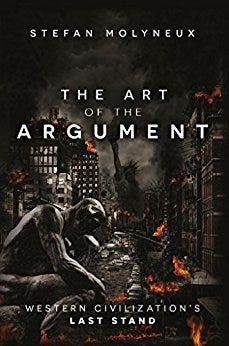
Stefan Molyneux has gone all Trumpet on us.
I've written about Molyneux before, most recently a two-post discussion early this year, keyed to his now-decade-old book, UNIVERSALLY PREFERRED BEHAVIOR (2007) in which he claimed to have figured out what are the rules of behavior all rational beings should follow, and to have inferred from them that the right social system is anarcho-capitalism.
That book wasn't a great one, frankly, and Molyneux at his best is a pale shadow of Murray Rothbard as an anarcho-cap figure. Still, he was on the good guy's side, as I keep score anyway.
Molyneux, though, has progressively defected. He is now entirely in the MAGA camp. The nation-state may never be legitimate, but it can be legitimate enough! at least if Donald Trump is its CEO.
Or ... something.
The news about Molyneux is that he is out with another book, THE ART OF THE ARGUMENT (2017). The is some copy from the amazon page: "'The Art of the Argument' shocks the dying art of rational debate back to life, giving you the essential tools you need to fight the escalating sophistry, falsehoods and vicious personal attacks that have displaced intelligent conversations throughout the world."
On one level, it's a fairly non-controversial guide to such matters as the difference between inductive and deductive reasoning, the classic proof that Socrates is mortal, a round-up of formal and informal fallacies (the usual suspects) etc. Much of this stuff is unobjectionable, even though it has been done better. Often.
Molyneux also wants to make his political points here, on another level. After all, he believes he proved the rightness of his politics ten years ago. All that is necessary now is to explain to the world what it means to have proven something, to cap that accomplishment.
As I've just noted, his new Trumpetry politics is quite different from what his politic seemed to be ten years ago but ... let that go.
What strikes me as a pragmatist, and so as an admirer of Charles Peirce, is how lame this book is on the subject of of abduction, a form of inference that may lie beneath both induction and deduction. Molyneux acknowledges there is such a thing as "abduction," but he has no idea what it means. Further, he's too lazy to look it up. So he punts.
I'll finish this thought in Part II.
Comments
Post a Comment